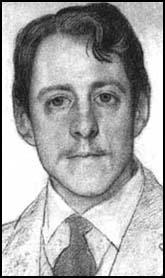Laurence Binyon

Laurence Binyon was born in Lancaster in 1869. At Oxford University he won the Newdigate prize for poetry. Influenced by the work of William Wordsworth, Binyon published two major volumes of poetry: Lyric Poems (1894) and Odes (1901).
On 21st September 1914, The Times published Binyon's poem about the outbreak of the First World War, entitled The Fallen. The poem was later to adorn war memorials throughout Britain. Binyon wrote the poem while working at the British Museum and did not go to the Western Front until 1916 when he went as a Red Cross orderly.
After the Armistice Binyon returned to the British Museum printed books department where he was in charge of Oriental prints and paintings. Binyon wrote several books on art including Painting in the Far East (1908), Japanese Art (1909), Botticelli (1913) and Drawings and Engravings of William Blake (1922).
Binyon was appointed Norton professor of poetry at Harvard in 1933. His later work included a translation of Dante's Divine Comedy.
Laurence Binyon died in 1943.
Primary Sources
(1) Laurence Binyon, For the Fallen (21st September, 1914)
With proud thanksgiving, a mother for her children,
England mourns for her dead across the sea.
Flesh of her flesh they were, spirit of her spirit,
Fallen in the cause of the free.
Solemn the drums thrill: Death august and royal
Sings sorrow up into immortal spheres.
There is a music in the midst of desolation
And a glory that shines upon our tears.
They went with songs to the battle, they were young,
Straight of limb, true of eye, steady and aglow.
They were staunch to the end against odds uncountered:
They fell with their faces to the foe.
They shall grow not old, as we that are left grow old:
Age shall not weary them, nor the years contemn.
At the going down of the sun and in the morning
We will remember them.
They mingle not with their laughing comrades again;
They sit no more at familiar tables at home;
They have no lot in our labour of the day-time;
They sleep beyond England's foam.
But where our desires are and our hopes profound,
Felt as a well-spring that is hidden from sight,
To the innermost heart of their own land they are known
As the stars are known to the Night;
As the stars that shall be bright when we are dust,
Moving in marches upon the heavenly plain;
As the stars are starry in the time of our darkness,
To the end, to the end they remain.

